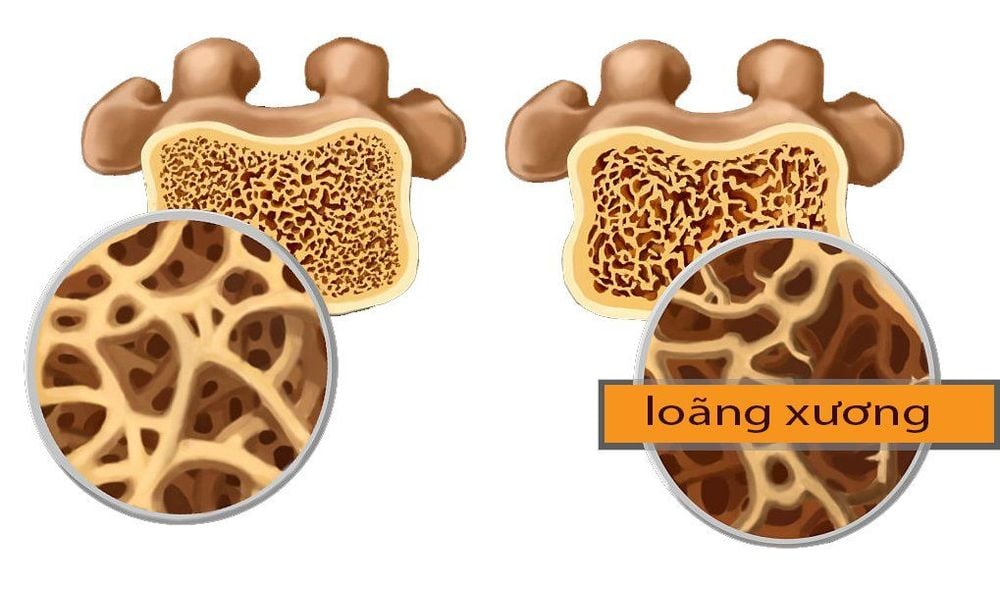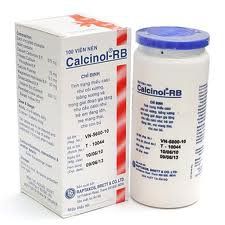This is an automatically translated article.
The article was professionally consulted with Master, Doctor Le Duong Tien - Doctor of Musculoskeletal Medicine - Department of Medical Examination & Internal Medicine - Vinmec Danang International Hospital.Calcium is an important micronutrient for the development of the skeletal system throughout a person's life. The calcium needs of adults are not the same, but vary with each certain age, also known as the calcium requirement according to age.
To ensure calcium needs every day, a complete nutrition needs to be done well. However, if the diet is deficient, calcium needs to be supplemented in other forms such as calcium tablets or solutions. Users need to understand what an adult's daily calcium requirement is, the benefits and risks of calcium supplements, and which preparations should be chosen.
1. The role of calcium
The human body needs calcium to build and maintain healthy bones. The heart, muscles, and nerves also need calcium to function properly. Many studies have also suggested that calcium, along with vitamin D, has many other benefits in the human body beyond the bones, such as the ability to protect against cancer, diabetes and high blood pressure. However, the evidence for these benefits is still unclear.If the body is not provided with enough calcium, many health problems will appear, the most common is osteoporosis. Those at high risk of calcium deficiency are children, adolescents, adults over 50 years old, and the elderly.

2. Adult calcium needs
Daily calcium requirements vary depending on age and sex. The table below shows the calcium requirements for adults of different sexes, where the upper limit is the maximum amount of calcium that should be supplemented, exceeding this threshold increases the likelihood of abnormalities related to calcium intake. excess calcium in the body.| Nam | Nhu cầu canxi mỗi ngày | Giới hạn trên hằng ngày |
| 19 – 50 tuổi | 1000 mg | 2500 mg |
| 51 – 70 tuổi | 1000 mg | 2000 mg |
| Từ 71 tuổi trở lên | 1200 mg | 2000 mg |
| Nữ | Nhu cầu canxi mỗi ngày | Giới hạn trên hằng ngày |
| 19-50 tuổi | 1000 mg | 2500 mg |
| Từ 51 tuổi trở lên | 1200 mg | 2000 mg |
3. Supplementing calcium through the diet
The body cannot produce calcium on its own, but must get it from many different sources. Calcium can be found in a variety of foods, including:Dairy foods such as cheese, milk, or milk Dark green leafy vegetables Edible soft-boned fish such as sardines, canned fish Calcium-fortified foods and beverages such as soy milk, cereals, and juices To absorb calcium, the body also needs vitamin D. A handful of foods naturally contain small amounts of vitamin D, such as: Whole canned salmon and egg yolks. Vitamin D can also be obtained from fortified foods and sunbathing. The daily requirement of vitamin D is 600 IU (about 15 micrograms) for an adult.

4. Who needs calcium supplements?
Even with a healthy and complete diet, it is difficult to get enough calcium. The following subjects are people who need to take calcium supplements:Vegetarian. Intolerance to lactose and dairy foods. Consume large amounts of protein or salt as they cause the body to excrete more calcium. Having osteoporosis. Long-term use of corticosteroids. Having gastrointestinal diseases that reduce calcium absorption such as enteritis, colitis. In the above situations, calcium supplements may be needed to meet the body's calcium needs.

5. Are calcium supplements harmful?
Calcium supplements are not for everyone. In case you have medical conditions that increase blood calcium, calcium supplements should not be used.There is an association between calcium supplementation and the risk of cardiovascular disease, although it has not been established officially. More research is needed for doctors to understand the effect of calcium supplements on the risk of cardiovascular conditions such as angina.
Several studies have shown that taking high doses of calcium from dairy foods or calcium supplements increases the risk of prostate cancer.
Until more information and research is available on these risks, we need to avoid excessive calcium supplements.

6. Calcium supplements
There are different types of calcium supplements available on the market. Each type has a different calcium content, suitable for each person's daily calcium needs. The most popular calcium supplements today are"Calcium carbonate (40% elemental calcium) Calcium citrate (21% elemental calcium) Calcium gluconate (9% elemental calcium) Calcium lactate (13% elemental calcium) Two The main forms of calcium supplements are carbonate and citrate. Calcium carbonate is the cheapest type, so it is often preferred. Other types of calcium supplements include gluconate and lactate.
In addition, some calcium supplements are combined with other vitamins and minerals. The most common is calcium combined with vitamin D or magnesium. Check the ingredient list for added calcium and if any other ingredients are included.

7. How to choose calcium supplements?
To meet the calcium needs of adults, calcium supplements are sometimes needed. In the face of a wide variety of products on the market, the following factors should be considered:Amount of calcium: Elemental calcium is the key to determining because this is the actual amount of calcium added. It is also absorbed by the body. Observing ingredients on product information helps users know the amount of calcium added. For example calcium carbonate has 40% elemental calcium, so 1250 mg of calcium carbonate contains 500 mg of elemental calcium. Tolerability: Calcium supplements can cause some unwanted side effects such as bloating, constipation. Calcium carbonate is the most constipating type. Users may have to try several calcium supplements from different brands to find the one that works best for them.

Please dial HOTLINE for more information or register for an appointment HERE. Download MyVinmec app to make appointments faster and to manage your bookings easily.
Reference source: mayoclinic.org













